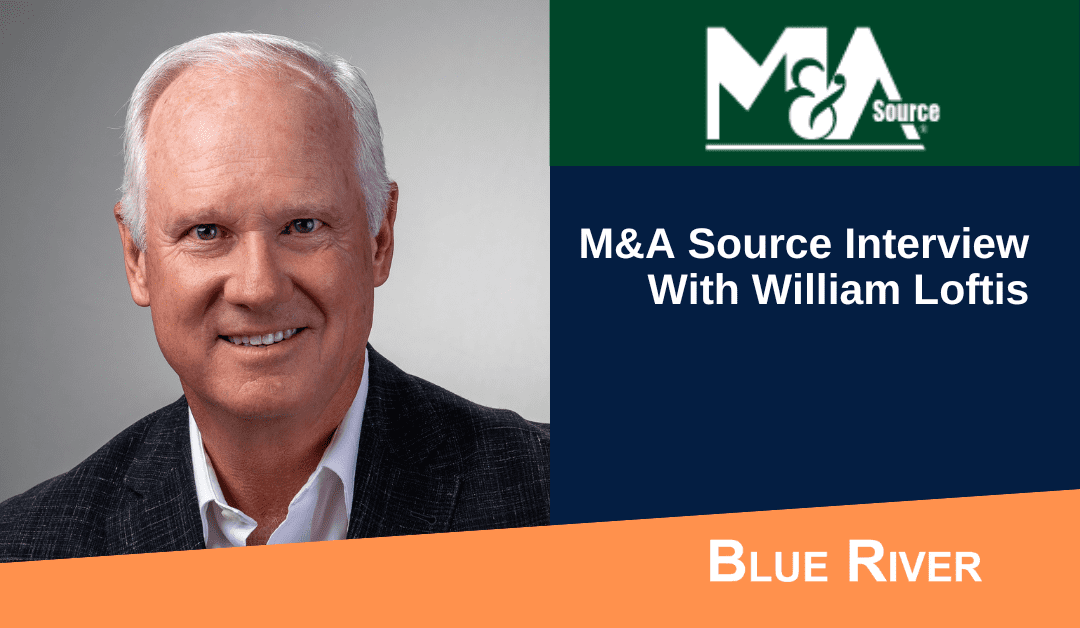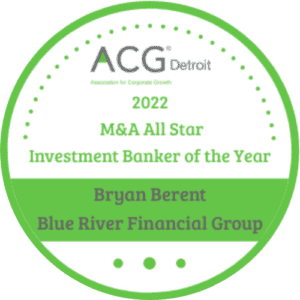M&A Source interviewed Blue River’s Managing Partner William Loftis on his M&A career, professional accomplishments, and changes he sees on the horizon that will impact the world of M&A. The full interview is available on the M&A Source website here.
/ M&A Source / — Tell us about your pre-M&A career and how it led you to doing this work?
Many, many moons ago when gas prices were beyond the reach of normal American citizens, inflation was in double digits, and another great Democrat governed the land (i.e., Jimmy Carter), I enrolled at Colorado State University in its Master of Science in Finance program. I thought the curriculum would position me to work in a variety of industries like investments or banking. The coursework was generally fun. I studied bank management, cost accounting, modern portfolio theory… but I was mostly intrigued by advanced courses in mergers and acquisitions and company values.
Fast forward a few years, I joined my dad in a startup title insurance agency. My dad was a remarkably smart attorney, and I was a cocky kid with a degree. Within a year, we had the opportunity to buy another title agency, so I pulled out my old graduate school notes to analyze the opportunity. We bought it. We paid far too much, but it became a nice springboard for growth.
Over the next 12 years, we grew the title agency to roughly 150 employees. My dad was 65, and ready to retire. He suggested we sell the business. I wanted to buy my dad’s stake, but like most sons, I didn’t have that kind of money. It would have been too risky for my dad to finance the transaction. In retrospect, I wish I knew about private equity firms and recaps back in 1994.
We determined to approach a single buyer, a publicly traded national title insurance underwriter (“Company A”). We took the following steps:
- Paid to have the business appraised.
- I assembled a marketing book on the company (my first CIM).
- My dad drafted a Confidentiality Agreement, and we approached Company A.
- The buyer eagerly signed the Confidentiality Agreement, and we shared the CIM.
I fell in love with the selling process. The buyer was sophisticated, gracious, flattering, and loved our agency. They offered one amount. We rejoined with a higher value. They agreed. We signed an LOI; went through due diligence; and prepared to close the deal.
I was extremely proud of our accomplishment… until the day before closing.
I had to notify our largest issuing underwriter (Company B), also a public company, that we were selling to Company A. I told the State Manager, “Today we are your biggest issuing agent in the State of Michigan. Tomorrow, we will be owned by your biggest competitor.”
In less than an hour, Company B’s CEO called imploring us not to sell to Company A. Without knowing the price or terms, he said he would double the offer!
My dad and I suddenly had a dilemma. Should we close with Company A on the original terms; renegotiate with Company A; suspend the process with Company A and begin anew with Company B?
This is when I discovered the meaning of the phrase “Pregnant with the Deal”. We closed with Company A at the originally negotiated price because: 1) the buyer’s board had already approved the sale and would not meet again for several weeks; 2) we felt honor bound; and 3) another due diligence process with a different buyer would have taken too long to complete with no assurance of a closing. Essentially, we settled for the bird in hand.
After the transaction, I had a nagging feeling that two really smart guys got schooled in the M&A process. Here are a few of the things we did wrong:
- Settled for too little – Because we did not run a competitive process, we never allowed the market to tell us what the value of our business was. Instead, we permitted an appraiser and a single buyer to determine price. We discovered another buyer with distinctly different strategic valuation views was willing to pay dramatically more. How much more might we have realized if we had only run a competitive process? We will never know for sure.
- Paid too much in taxes – We accepted an asset transaction structure rather than a stock deal. We learned later the buyer would have acquired the stock in our C-corporation without a price concession if we had only asked for it. Instead, we accepted the asset offer with no guidance from a tax expert. In the end, we paid taxes at the corporate level and then again at the personal level. Double taxation dramatically reduced the net value of the deal.
- We accepted wrong terms – The buyer offered to use a combination of cash and its common stock as currency in the deal. My dad wanted all cash. He reasoned, “I already have stock in a title business. Why would I want stock in another title business?” I offered several reasons like liquidity, opportunity for appreciation, dividends, deferred taxes in a like-kind exchange… It is interesting how risk tolerance diminishes as one ages. He wanted all cash – period. I would have preferred their stock together with a modest amount of cash. With an all-cash deal, we still had to find other places to invest the money.
As a side note, the price of Company A’s stock at the time of closing was $11 per share. It would have been restricted for two years. Exactly 24-months after our deal closed, Company A’s stock price on NASDAQ was $64 per share. We might have realized 6X more if had we believed in the buyer’s future.
Here is what I discovered from our transaction:
The mistakes were preventable – We were very good at running our business, but we were unfamiliar with how the private capital marketplace operated. If only had someone to guide us through the highly confidential and complicated process, we could have avoided minefields and achieved a much better outcome.
Mistakes are permanent and unrecoverable – Once the closing papers are signed, it’s like taking your hand off a chess piece – the move is made and there is no going back. Lost opportunities are gone forever.
Middle market M&A is a specialized area of knowledge – The stuff I learned in graduate school mostly applied to publicly traded companies. Private company transactions take place in the private capital marketplace, which is vastly different from public markets.
In the years following the sale of our title company, I worked with Company A in a variety of executive roles including searching for other title companies to acquire. I participated on pre- and post-closing teams to identify and ultimately capture synergies and assimilate cultures.
I left the title company and began receiving calls from owners of title agencies and real estate companies from around the country asking for selling guidance. I wrote reports at an hourly rate advising on things to do and things to avoid. I discovered I loved helping owners through selling process, so I decided to focus on middle market transactions as a new profession.
I quickly learned I knew more about M&A than many, but not much more. So, I immersed myself in industry education. I took courses from IBBA and M&A Source. I earned the CBI and M&AMI. I joined AM&AA to be sure I was getting a full-orbed perspective and earned the CM&AA. I became a Certified Valuation Analyst through NACVA. I got securities registered with the Series 7, 24, 66, 79, and 82. I read whatever I could find. I picked the brains of M&A lawyers at lunch and on the golf course. I became friends with PE professionals. The passion for M&A knowledge became an all-consuming unquenchable pursuit.
Another thing I did back then and still do today, is talk to owners who have gone through the selling process. I find their names in press releases and other places. Nearly all owners are willing to discuss their transactions if I don’t get too nosey about prices and terms. I mostly want to understand their experiences. Did the sale deliver what they hoped? What surprised them about the process? Looking back, did they have any regrets? The most often cited lament I have heard through the years is, “I wish I knew then what I know now about selling a business. I would have done things differently.”
My good friend Darrell Arne frequently asks, “What is the why behind what you do?” For me, I want to help owners achieve regret-free outcomes by providing actionable M&A knowledge before it’s too late. I want owners equipped with the foreknowledge necessary to make wise decisions on the most important transaction in their lifetimes.
Read the full interview on the M&A Source website here.
William “Bill” Loftis is Managing Partner and co-founder of Blue River. Mr. Loftis developed a passion for M&A as a transaction principal, and has assisted buy and sell-side clients through the M&A process in multiple industries. He earned a B.A. in Business Administration from Alma College and a Master of Science in Finance from Colorado State University. Bill’s full bio is available here.
About Blue River
Blue River Financial Group is a middle market merger and acquisition advisory firm headquartered in Bloomfield Hills, Michigan. It assists corporations, private equity groups and individuals in the sale and acquisition of businesses, and has completed assignments in multiple business segments. With over 20 years of experience spanning across 50 global industries, Blue River provides a suite of services to middle market clients including corporate development, private equity support, valuations and transaction consulting, placing a premium on relationship-centered transaction counsel and client focus.








